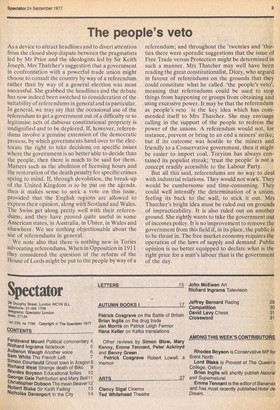The people's veto
As a device to attract headlines and to divert attention frOm the closed shop dispute between the pragmatists led by Mr Prior and the ideologists led by Sir Keith Joseph, Mrs Thatcher's suggestion that a government in confrontation with a powerful trade union might choose to consult the country by way of a referendum rather than by way of a general election wasP most successful. She grabbed the headlines and the debate has now indeed been switched to consideration of the suitability of referendums in general and in particular. In general, we may say that the occasional use of the referendum to get a government out of a difficulty or to legitimise acts of dubious constitutional propriety is undignified and to be deplored, if, however, referendums involve a genuine extension of the democratic process, by which governments hand over to the electorate the right to take decisions on specific issues where the government is no better able to decide than the people, then there is much to be said for them. Matters such as the abolition of licensing hours and the restoration of the death penalty for specific crimes Spring to mind. If, through devolution, the break-up of the United Kingdom is to be put on the agenda, then it makes sense to seek a vote on this issue, provided that the English regions are allowed to express their opinion, along with Scotland and Wales. The Swiss get along pretty well with their referendums; and they have proved quite useful in some American states, in Australia, in Ulster, in Wales and elsewhere. We see nothing objectionable about the use of referendums in general.
We note also that there is nothing new in Tories advocating referendums. When in Opposition in 1911 they considered the question of the reform of the House of Lords might be put to the people by way of a referendum; and throughout the 'twenties and 'thirties there were sporadic suggestions that the issue of Free Trade versus Protection might be determined in such a manner. Mrs Thatcher may well have been reading the great constitutionalist, Dicey, who argued in favour of referendums on the grounds that they could constitute what he called 'the people's veto', meaning that referendums could be used to stop things from happening or groups from obtaining and using excessive power. It may be that the referendum as people's veto is the key idea which has commended itself to Mrs Thatcher. She may envisage calling in the support of the people to redress the power of the unions. A referendum would not, for instance, prevent or bring to an end a miners' strike; but if its outcome was hostile to the miners and friendly to a Conservative government, then it might be easier to import coal. Toryism has always contained its populist streak; 'trust the people' is not a concept readily accessible to the LabOur Party.
But all this said, referendums are no way to deal with industrial relations. They would not work. They would be cumbersome and time-consuming. They could well intensify the determination of a union, feeling its back to the wall, to stick it out. Mrs Thatcher's bright idea must be ruled out on grounds of impracticability. It is also ruled out on another ground. She rightly wants to take the government out of incomes policy. It is no improvement to remove the government from this field if„ in its place, the public is to be thrust in. The free market economy requires the operation of the laws of supply and demand. Public opinion is no better equipped to declare what is the right price for a man's labour than is the government of the day.


































 Previous page
Previous page